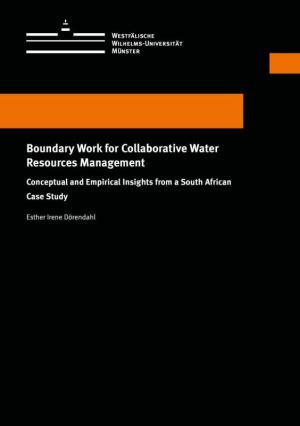Boundary Work for Collaborative Water Resources Management: Conceptual and Empirical Insights from a South African Case Study
Keywords:
socio-ecological systems , transition research , sustainability science, water , water resources management, boundary work , South AfricaSynopsis
Water is a basis for life and ecosystem health. And water, especially in regions affected by water scarcity, is a highly contested and politicised natural resource. The state-of-the-art in sustainable water resources management requires collaborative approaches that foster the integration of conflicting interests of multiple stakeholders. Achieving integration in complex and contested real life situations however remains a major challenge. Boundary work can facilitate this ambitious goal. This study evolves boundary work science to improve collaboration in the water sector. It develops a framework for boundary work that enables understanding, structuring and approaching barriers for collaborative water resources management. A case study from the Garden Route region, South Africa gives a grounded basis for the conceptual developments and further provides in-depth insights into reasons and obstacles for collaborative water resources management in a contested local case. The case study serves both: An intrinsic analysis of a conflictive case, and conceptual developments to the boundary work framework – tested against local realities.
Permalink
https://nbn-resolving.de/urn:nbn:de:hbz:6-38229604351
ISBN
978-3-8405-0131-9
Paperback, XXIII, 272 pages

Downloads
Forthcoming
Categories
License

This work is licensed under a Creative Commons Attribution-NonCommercial-NoDerivatives 3.0 Unported License.

